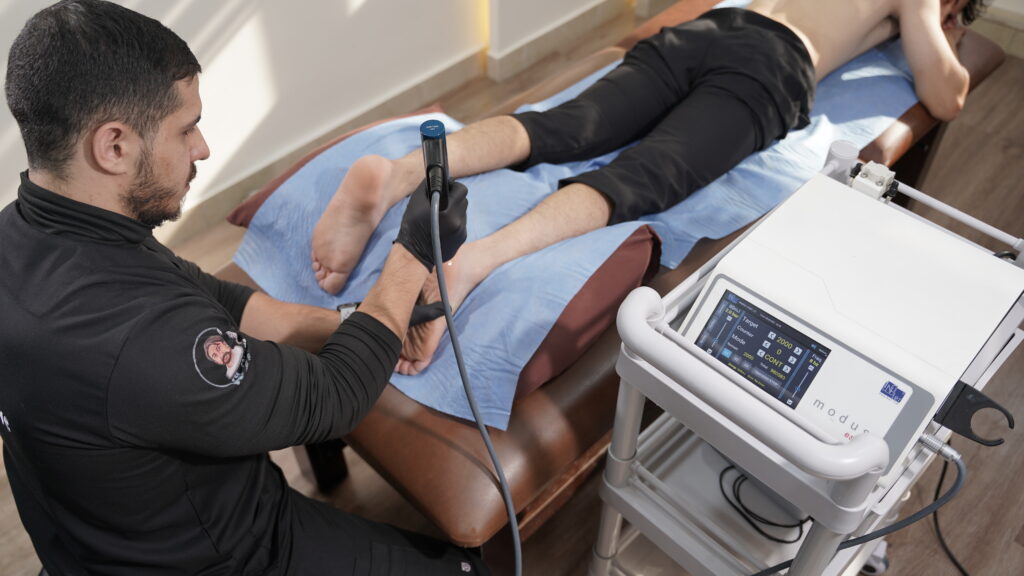Plantar Fasciitis: Exploring Causes, Symptoms, and Solutions
Kilani
December 17, 2024

Plantar Fasciitis Treatment Definition
Plantar Fasciitis Treatment is a common orthopedic condition that involves inflammation of the plantar fascia—a thick band of connective tissue running along the sole of the foot, from the heel to the toes. This condition is a leading cause of heel pain and can significantly impact daily activities, particularly those requiring walking or standing
In kilani center we recognise this problem when the patient said that he has this sharp pain in the first few steps on morning or after long period of rest.
Plantar Fasciitis Treatment Causes
Plantar fasciitis develops due to repetitive stress and strain on the plantar fascia, leading to microtears and inflammation. Common causes include:
1. Overuse: Excessive physical activity, especially running or jumping, can strain the plantar fascia.
( we see this with athletes clients in kilani physiotherapy center)
2. Improper Footwear: Shoes that lack proper arch support or cushioning can increase stress on the fascia.
3. Foot Structure: Flat feet, high arches, or abnormal walking patterns can contribute to uneven distribution of weight, placing excessive pressure on the fascia.
4. Occupational Risks: Jobs requiring prolonged standing or walking on hard surfaces can exacerbate the condition.
5. Age and Weight: Middle-aged individuals and those who are overweight are more susceptible.
Symptoms
The hallmark symptom of plantar fasciitis is sharp pain in the heel, our physiotherapists in kilani center noticed that the symptoms differ depending on the body reaction often described as a stabbing sensation. Symptoms typically include:
1. Morning Pain: Pain is most intense during the first steps after waking up.
2. Post-Activity Discomfort: Pain may worsen after prolonged periods of standing, walking, or physical activity.
3. Localized Tenderness: The heel or arch of the foot is often tender to the touch.
4. Stiffness: Reduced flexibility in the foot and ankle is common.
Plantar Fasciitis Treatment Methods
Effective management of plantar fasciitis includes a combination of self-care measures, medical interventions, and lifestyle modifications:
1. Rest and Ice: Avoid activities that worsen the pain and apply ice packs to reduce inflammation.
In kilani centerour physiotherapists give this advice from first visit to do it at home in repetitive times every day and its has a magical effect on the condition
2. Stretching Exercises: Targeted stretches for the calf muscles and plantar fascia can relieve tension and improve flexibility.
3. Orthotic Devices: Insoles, heel cups, or custom orthotics provide cushioning and arch support.
4. Medications: Over-the-counter pain relievers like NSAIDs can help reduce pain and swelling.
5. Physical Therapy: A structured rehabilitation program, including strength-building exercises, can expedite recovery.
6. Night Splints: These devices keep the foot in a dorsiflexed position, preventing morning stiffness.
7. Advanced Treatments: Corticosteroid injections, shockwave therapy, or, in severe cases, surgery may be recommended.
The Role of Physiotherapy in Plantar Fasciitis Treatment
Physiotherapy plays a pivotal role in managing plantar fasciitis by addressing the root causes and promoting healing. Key benefits include:
1. Pain Relief: Techniques like ultrasound therapy and manual massage reduce inflammation and discomfort.
Our physiotherapists found that manual therapy has main effect of treatments in controlling pain
2. Improved Flexibility: Stretching routines targeting the Achilles tendon and plantar fascia alleviate tightness.
3. Strengthening Exercises: Strengthening the muscles of the foot, ankle, and lower leg enhances overall foot stability and function.
4. Gait Analysis and Correction: Physiotherapists can identify and correct biomechanical issues contributing to the condition.
We found in kilani center that Flat foot condition is most common feature
5. Preventive Strategies: Guidance on proper footwear, posture, and activity modifications minimizes recurrence.
Precautions
To prevent plantar fasciitis or its recurrence, individuals should adopt the following precautions:
1. Wear Supportive Shoes: Opt for footwear with adequate arch support and cushioning.
2. Maintain a Healthy Weight: Reducing body weight lessens the stress on the feet.
3. Warm-Up and Stretch: Incorporate stretching exercises before physical activities to prevent strain.
4. Limit High-Impact Activities: Alternate between high- and low-impact exercises to avoid overloading the fascia.
5. Listen to Your Body: Address foot pain early to prevent chronic issue
Conclusion
Plantar fasciitis is a manageable condition with the right combination of treatments and preventive measures. Early intervention, lifestyle modifications, and physiotherapy can help individuals overcome the pain and regain their quality of life. By taking proactive steps, those affected can reduce the risk of recurrence and maintain healthy, pain-free feet.
If you have such pain please contact us in kilani physiotherapy center and we will help you in our two branches in Amman and dubai
